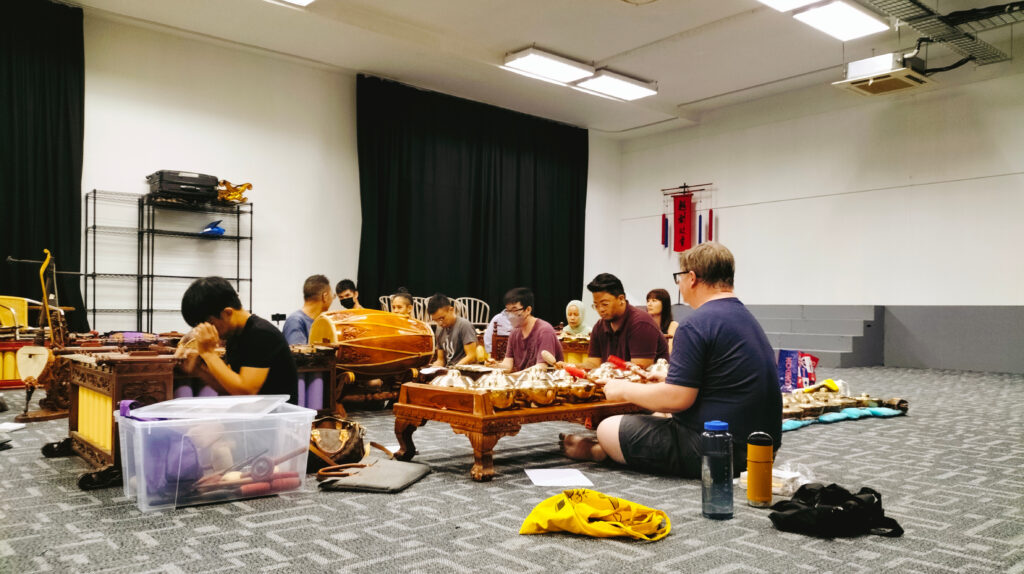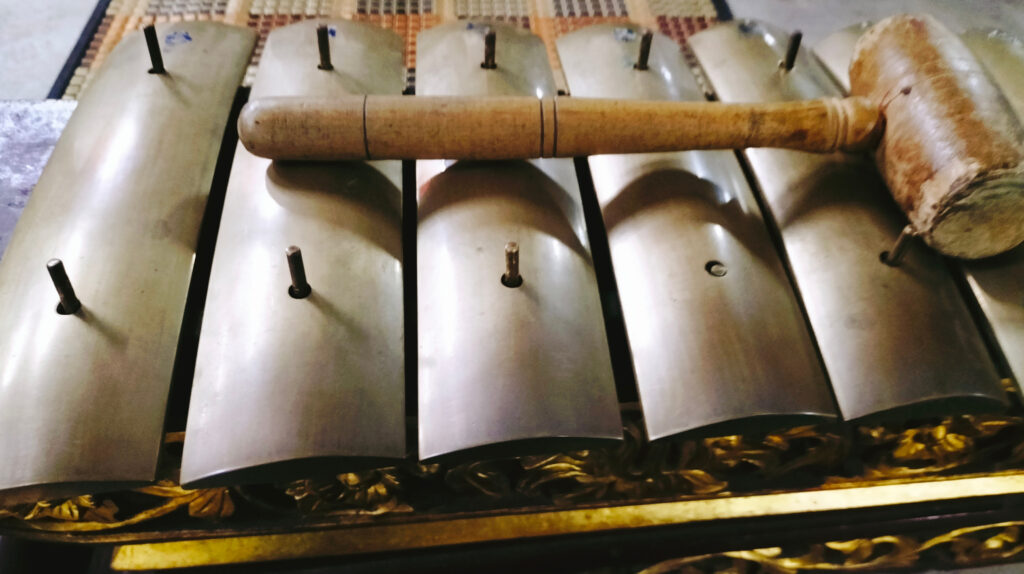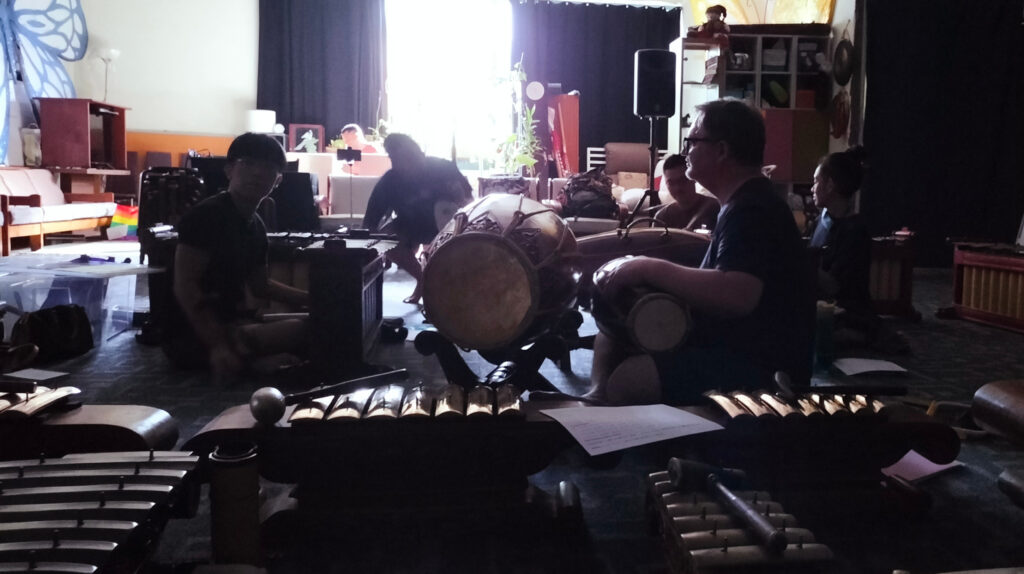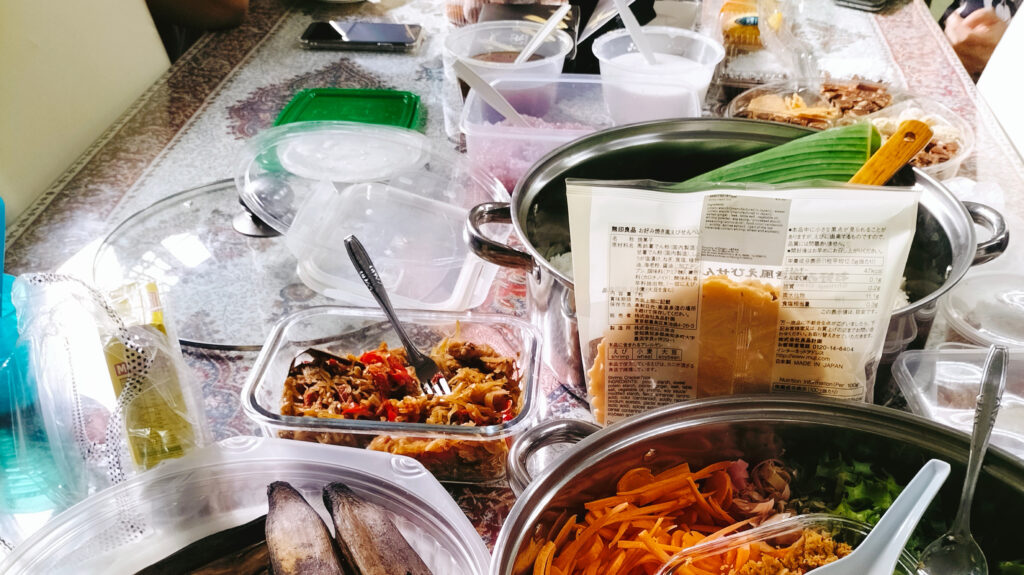Join Nuri as she seeks out a spark of her home in the faraway land of Singapore—in the form of gamelan.
“Six, five, six, five, three, two….”
One lesson I’ve learned during the twenty-two years of my life is that gamelan is much more fun when you’re the one who plays it.
We might listen to gamelan recordings, using them as background noise while working. Or we might think of gamelan pieces as calming music for better sleep and study sessions. We don’t think that gamelan can be fun and exciting … until we try playing it firsthand. Then a whole new world opens to us.
That’s how I felt when I tried playing gamelan for the first time in my life. Upon hitting the gong and hearing the voice reverberate around the room, I knew that I was going to love playing gamelan. And I kept my enthusiasm with me until it was time to go to Singapore.
Before coming to Singapore, I joined a gamelan community in my department called Prasasti. We used to play a lot, twice a week, like clockwork. However, all the practices were put off when the COVID-19 pandemic came. I had been waiting endlessly for the right time to practice again, yet nothing related to practice and rehearsal was brought up until it was time to go to Singapore.
Aside from wanting to experience the joy of learning at one of the top world universities, Nanyang Technological University, I also (desperately) wanted to practice playing gamelan again. It had been two years since the last time I played the instruments, and I thought to myself, I’m going to search for a gamelan community when I arrive in Singapore!

I decided that it would be worth the effort to search for a gamelan community, however rare it was. What could I say; I missed practicing! I miss trading stories and laughing together with my fellow gamelan players.
While adjusting to living in Singapore, I asked around everyone I met: is there a gamelan group here? At first, I scrolled through NTU’s list of clubs and activities to join. Who knew, maybe there was a group that I could join. As expected, there was nothing Indonesian or gamelan on NTU’s list. I also asked the Indonesian Students’ Association at NTU, but sadly, the answer was no.
Oh well. Time to use the might of the internet to search for a gamelan community.
When I typed gamelan in Singapore, two results appeared: Gamelan Asmaradana and Singa Nglaras. At first glance, Gamelan Asmaradana seemed to be more popular, but its social media didn’t seem updated. I checked its Instagram. No recent update. Then Facebook. No update either. Then I looked up their website. Nothing indicated practicing in any way, shape, or form. Thus, I went with the second result, Singa Nglaras, whose Instagram account was updated a few days ago.
According to the website, Singa Nglaras means “relaxing lion”, where they welcome any and all who want to play gamelan, no prior experience needed. That was what cemented my decision to contact the music director to ask to join the community. The director, called Xin Wei, informed me that the next rehearsal would be held at Mandai Estate, located in the far north of Singapore.
“I’m sorry that the place is agak ulu (a bit far) and sederhana (plain),” he told me in chats.

I replied that I didn’t mind and looked forward to going to practice. Since Singa Nglaras is under the Department of Southeast Asian Studies at the National University of Singapore (NUS), I was certain that NUS students would also come. And since it’s an Indonesian-based ensemble, surely there would be some Indonesians who also joined for practice.
They didn’t.
Upon meeting the group for the first time, I was startled because of several reasons: first, everyone who came was older than 30! There were no students at all in sight. Second of all, no Indonesians either! I was the only Indonesian there. I was also shocked that all of the members were very proficient at playing gamelan. What the heck, I thought, I am the only beginner here!

Mas Xin Wei, the music director, said that the members “are learning kendhang (drum), so that the pieces are simple ones, not too complicated.” He assured me that I would be able to adjust quickly even though I told him that I hadn’t played gamelan since the beginning of the pandemic.
Did I manage to follow their rhythm and play in sync with them? Of course I didn’t. And they pronounced the notes in English, while I was used to the Javanese pronunciation, so it was safe to say that I was a mess during the session.

After the first rehearsal, I honestly had second thoughts—it might be better if I didn’t come again. The group seemed tight-knit and relaxed. It was as though no one from outside could get in.
I’m so glad that my assumption was proven wrong.
I made so many friends and acquaintances in Singa Nglaras. In my second meeting, I met a man around my age called Jee, who specializes in contemporary dance and also plays gamelan in Berlin. After Jee, there came an Indonesian called Cahya, then a duo of the Dutch: Kevin and Chris. I was also slowly getting to know the older, regular members of Singa Nglaras. There was Pak Jan, an associate professor at NUS; Mbak Rose and Mbak Nani as sindhen (female singers); and many others who all love Java and its tradition.

Loving Java and wanting to know more about it … it’s so rare to see such enthusiasm in Yogyakarta, especially in the younger generation. They were so excited when I told them I came from Yogyakarta. They often asked me questions about the meanings of the piece we practiced at nights, the traditions in Yogyakarta, and the philosophy of the seemingly regular activities such as dolanan (traditional games), singing nursery rhymes, and folding clothes.
“The Javanese, they are very wise,” Mbak Nani once commented when we were discussing tembang macapat in Mas Xin Wei’s house. “They created pieces that represent the cycle of birth, and those pieces become a guide for us to live our life, so that it’s filled with all things good and just.”
I was quite ashamed that a Singaporean knows more about the philosophy of the Javanese and loves it, even more than I do.
Aside from the technique of playing different instruments—believe me, it’s complicated—I also learned that the goal of playing gamelan is to bring out the rasa (feel). Mas Xin Wei told me that as a musician, one should be able to both memorize the pieces and sight-read the notes. As echoed by another gamelan player in Yogyakarta, memorizing the pieces will make it easier to emphasize the “feel” that makes the piece sound seamless.

Out of all the experiences that Singa Nglaras has taught me, I won’t forget the most important lesson: be kind to others and help them when we can. I saw Singa Nglaras’ kindness when a member drove me back to the closest MRT station to my dorm even though it was our first time meeting; when Mas Xin Wei and others paid for the taxi ride; when Mbak Nani invited me to an iftar at her apartment and gave the security guard the snacks. Their kindness, of course, also showed when we were practicing—I made so many mistakes and they were not angry at all.

They encouraged me to keep trying, that eventually, I would master the piece we were practicing.
Honestly, I’ve experienced the bad aspects of a gamelan community before, the kind where I felt like an outsider who knew that she didn’t belong there. However, joining Singa Nglaras was the best decision I made during my exchange; they felt like home to me. All of the lessons I’ve learned and the kindness I’ve received during my journey there, I would bring them back to Yogyakarta, the beloved hometown where Javanese gamelan originated and flourished.

Created by: Nur Fi’llia Nugrahani
Nuri is a final-year English Department student at Universitas Gadjah Mada. Aside from randomly wandering around the streets of Singapore in search of hidden gems, she likes to join gamelan rehearsals at NUS and Kaki Bukit with Singa Nglaras.

Keren buangettttt
Always love to hear your unique stories 🥺 pls write more!